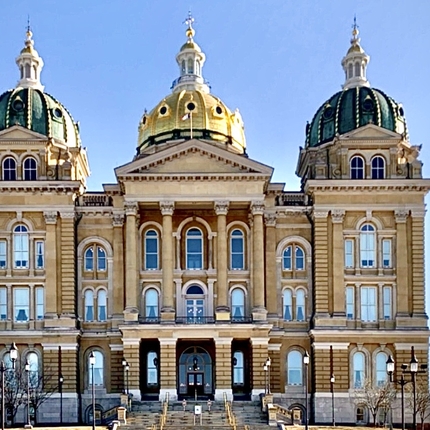By Katie Rock, former staff member
In 2017, we developed an active presence on Iowa state policy. Our priority issues included clean energy and water quality. We collaborated with coalition partners, developed relationships with key legislators, and engaged Iowa supporters.
Relevant developments concerning priority legislation will be shared via Iowa Legislative Update emails. Email [email protected] to sign up for updates.
Clean energy
Iowa’s solar tax credit provides a 50 percent match with federally available credits. The state tax credit is a temporary, capped credit that successfully supports the emerging market of solar energy. In 2017, the credit was decreased from $5 million per year to $4 million per year.
Solar has become increasingly popular in rural Iowa, leading several incumbent utilities and conservative lawmakers to transfer resources away from clean energy programs to address a growing budget deficit. This trend was evident in 2017, and will continue into 2018.
In this session, we anticipate additional attacks on distributed energy and net metering. We will oppose efforts to erode clean energy policies that have been particularly beneficial in rural Iowa. We will fight to protect against further cuts to clean energy funding in 2018.
Water quality
In 2017, we supported smart tax policy to fund Iowa’s Natural Resources and Outdoor Recreation Trust Fund which would create a new, permanent funding stream for water quality. Water quality and watershed management bills were introduced in both the Senate and the House that included provisions to reappropriate funding from the Rebuild Iowa Infrastructure Fund for in-field and edge-of-field practice installation. Ultimately, legislators were unable to pass a bill.
Gov. Kim Reynolds has stated she wants a water quality bill to be the first bill she signs as governor. Many of the organizations that collaborated to form Iowa’s Water and Land Legacy (IWILL) coalition will push for progress.
Water quality remains a significant challenge in Iowa. The state has been unwilling to provide funding and technical assistance needed to make progress. One package of legislation introduced in 2017 embraced a “watershed approach,” incorporating accountability and directing resources toward areas most in need of support. An alternative package from 2017 would give more funding to water quality but in a less structured way. It is believed that some form of these packages will pass in 2018. The question remains which one, how quickly, and with how much debate.
What do you think?
Let us know your input on these priorities and tell us about other state issues that are important to you. Are you interested in writing a letter to your legislator or even testifying at the state capitol? Contact us at [email protected].





